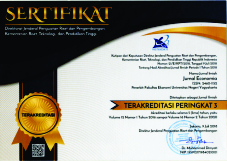Peace in Religious Teachings and its Impact on Economic and Political Stability
DOI:
https://doi.org/10.21831/economia.v20i1.66966Keywords:
Value of peace, religious teaching, economic and political stabilityAbstract
Abstract
This study aims to delve into the values of peace within Islam, Hinduism, Buddhism, and Christianity in Malaysia and its profound influence on the country's economic and political stability. This study employs a qualitative approach, utilising both primary and secondary sources. In-depth interviews were conducted with religious leaders representing Islam, Hinduism, Buddhism, and Christianity, while relevant documentation was used as a secondary source. The findings indicate the shared emphasis among religious leaders upon cultivating inner peace within their respective faiths. Each religion advocates that spiritual practices foster inner peace, contributing to a harmonious society, nation, and economic resilience. Conversely, neglecting these religious teachings can lead to violence, social issues, and an absence of peace within the country. Therefore, this study posits that peace holds immense significance, urging its integration among believers and indirectly impacting Malaysia's economic development and political stability.
Keywords:Value of peace, religious teachings, economic and political stability.
References
Abbasi, A. N. (2023). Religion and Foreign Policy Traditional Islamic and Iranian Islamic counterpoise approach to regional peace [Master's Thesis]. Linnaeus University.
Abd Razak, A., Ahmad Zulfadhli, K., & Idrus, F. (2016). Exploring Educational Leaders' Perception on the Feasibility of Offering Peace Education: A Case Study. Proceedings of the International Conference on Education towards Global Peace, 1–9. http://www.iium.edu.my/capeu2016/index.php/proceedings/http://www.iium.edu.my/capeu2016/index.php/proceedings/
Abu Bakar, I. (2013). The Religious Tolerance in Malaysia: An Exposition. Advances in Natural and Applied Sciences, 7(1), 90–97. https://www.researchgate.net/publication/236336271
Abu Nimer, M. (2001). Conflict Resolution, Culture, and Religion: Toward a Training Model of Interreligious Peacebuilding. Journal of Peace Research, 38(6), 685–704.
Abu-Nimer, M. (2000). A Framework for Nonviolence and Peacebuilding in Islam. Source: Journal of Law and Religion, 15(1), 217–265.
Aliyu, Y. (2022). The Role of Islamic Religion in Maintaining Peace in Nigeria. https://www.researchgate.net/publication/361053510
Ayuba Jalo, S., Mande, H., & Mohammed, I. I. (2022). The Impact of Foreign Religions on African Traditional Values a Threat to Peace in Nigeria. Advance Journal of Current Research, 7(11), 29–26.
Carothers, T., & O'Donohue, A. (2020). Political Polarization in South and Southeast Asia: Old Divisions, New Dangers.
Department of Statistics Malaysia. (2022). Department of Statistics Malaysia. https://www.dosm.gov.my/portal-main/release-content/current-population-estimates-by-adminstrative-district
Evans, J., Starr, K. J., Corichi, M., & Miner, W. (2023). Buddhism, Islam and Religious Pluralism in South and Southeast Asia.
Farhana, N., Rahman, A., & Khambali@hambali, K. M. (2013). Religious Tolerance in Malaysia: Problems and Challenges. International Journal of Islamic Thought, 3. https://doi.org/10.24035/ijit.3.2013.007
Firdous, Q., Yasin, M. Z., Hussain, M., Shahani, A. G., Yousaf, M., & Aslam Ejaz. (2023). Faith as a Catalyst for Peace: The Islamic Perspective on Conflict Resolution. Russian Law Journal, XI(12), 155–164.
Husin, W. N. W., & Ibrahim, H. (2016). Religious Freedom, The Malaysian Constitution and Islam: A Critical Analysis. Procedia - Social and Behavioral Sciences, 217, 1216–1224. https://doi.org/10.1016/j.sbspro.2016.02.152
Ibiyemi, L. A., & Salako, T. A. (2021). The Role of Islamic Religious Education in Promoting Peace, Security and Sustainable Development in Nigeria. Religion's Educator, 19(1), 10–20. https://www.researchgate.net/publication/361417723
Institute for Economics & Peace. (2009). Peace, its Causes and Economic Value.
Institute for Economics & Peace. (2015). Five Key Questions Answered on the Link Between Peace & Religion. www.economicsandpeace.org
Institute for Economics & Peace. (2019). Global Peace Index 2019.
Institute for Economics and Peace (IEP). (2015). Peace and Religion: Quantifying Peace and Its Benefits. www.economicsandpeace.org
Islam, M. H. (2020). Tolerance Limitation in Facing Religious Diversity Based on the Teaching of Islam. Nazhruna: Jurnal Pendidikan Islam, 3(1), 1–13. https://doi.org/10.31538/nzh.v3i1.483
Khan, S., & Leonardo, K. (2023). Religions for Peace Report 2022. http://www.rfp.org
Kleindienst, P. (2024). The Role of Education on Human Dignity: Fostering Peace and Diminishing Violence. Religions, 15(66), 1–20. https://doi.org/10.3390/rel15010066
Melnik, S. V. (2022). Religions for Peace or Religion of Peace? Some Reflections on the Trends in the Development of Inter-Religious Dialogue*. Russian Journal of Cultural Studies and Communication Russian Journal of Cultural Studies and Communication. 2022, 1, 122–135. https://doi.org/10.24833/RJCSC-2022-1-2-122-135
Othman bin Abdullah. (2002). Islam and Democracy: Reflecting the Role of Islam in Malaysia and Indonesia.
Polak, R., & Rohs, P. (2023). Philosophy and Politics-Critical Explorations Values Politics Religion: The European Values Study (26th ed., Vol. 26). Springer.
Smock, D. R. (2006). Religious Contributions to Peacemaking: When Religion Brings Peace, Not War.
Sulaiman, K. U. (2021). An Islamic Perspective on Peaceful Coexistence. European Journal of Theology and Philosophy, 1(5), 29–43. https://doi.org/10.24018/theology.2021.1.5.50
Suraju, S. B. (2014). Peace and Religious Tolerance Education in Nigeria: The Islamic Perspective. World Educators Forum, 3(1), 309–322.
Tan, M. M., Musa, A. F., & Su, T. T. (2022). The role of religion in mitigating the COVID-19 pandemic: the Malaysian multi-faith perspectives. Health Promotion International, 37(1). https://doi.org/10.1093/heapro/daab041
Yazdani, A. (2020). The culture of peace and religious tolerance from an Islamic perspective. VERITAS, 47, 151–168.















